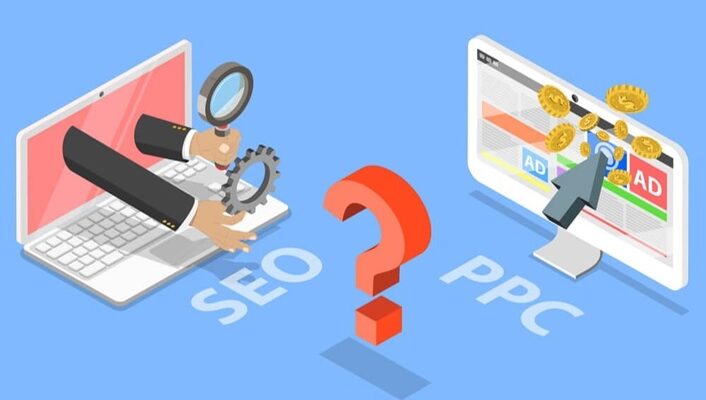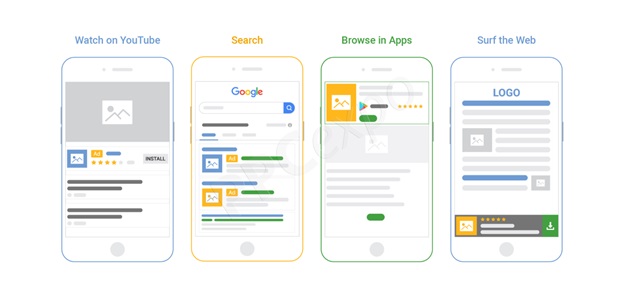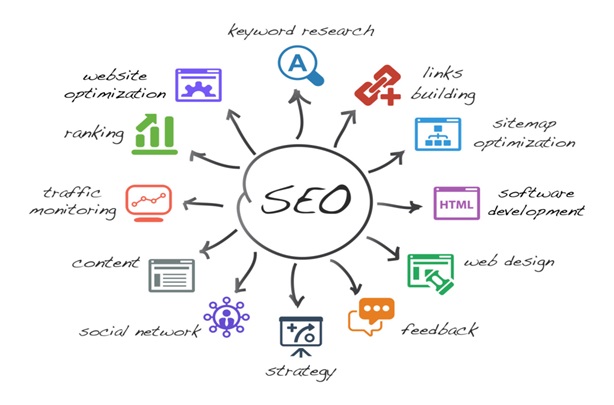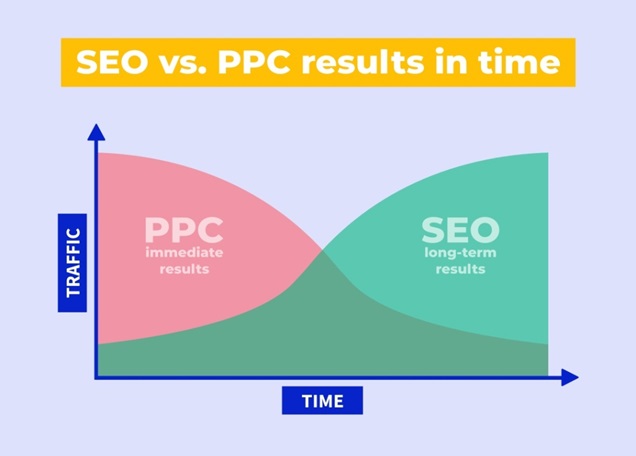
When figuring out how to allocate their digital marketing budget, many business owners get uncertain about how to split it between paid ads and optimising their site for higher organic ranking.
Doing this right is key to achieving your business’s short-term targets while continuously dropping customer acquisition costs to increase profitability over time.
In this article, we’ll cover how PPC and SEO work and their pros and cons to help you make the right decision. We’ll also show you how combining them can also bring amazing benefits.
What’s PPC?
PPC stands for pay-per-click. As the name suggests, it refers to paid advertising campaigns in which you pay for the clicks generated on your ads.
There are many PPC ad networks where you can run ads like Google Ads, Facebook Ads, LinkedIn Ads, and more. Many of them, including Google, display ads not only on their own platforms but also on partner sites.
To start running a PPC campaign, get clear on who your audience is and pick an ad network that gets your ads in front of it.
For instance, while TikTok is ideal for targeting teenagers, Twitter is better for reaching people in their 30s with higher education.
Then, define your campaign objective (the most common are conversions and brand awareness) and determine which ad formats are best for them. For brand awareness campaigns, for instance, video ads are usually better than text-only ads.

Other aspects of a PPC campaign include choosing your keywords, using analytics tools to track results, optimising your ads and campaigns over time, and more.
The most significant advantages of PPC are being able to generate immediate results and having complete control over how many people and which audiences see your ads. Besides, most ad networks don’t require high budgets to start. Facebook Ads, for instance, allows you to run digital marketing campaigns for as little as $5 per day.
The downside is that your cost per lead doesn’t tend to fall over time as with SEO.
Pros of PPC
- Generates fast results
- High control over your lead generation (quantity and quality)
- Flexible (you can start with little investment)
Cons of PPC
- Higher customer acquisition costs
- CPC may suddenly vary due to changes in policies and competitor behavior
What’s SEO?
SEO, or Search Engine Optimisation, consists of your strategies to rank high on SERPs (search engine results pages).
We can split SEO tactics between On-Page SEO, Off-Page SEO, and Technical SEO.
On-Page SEO refers to the strategies we implement on the content. That includes optimising it with keywords, splitting it into sections (H1s, H2s, H3s, paragraphs, etc.), optimising images, adding internal and external links, and more.
On the other hand, Off-Page SEO involves distributing your content through social media platforms, link-building campaigns, and others. Besides bringing more visitors, those strategies also increase your site’s domain authority, which helps it rank higher.

Finally, Technical SEO focuses on how well search engines can crawl and index your site. Some technical SEO tactics include optimising site speed and performance, structuring data, creating sitemaps, and more.
To implement SEO strategies, you can start by doing simple tasks like optimising your content for keywords and generating some backlinks.
But to employ more advanced strategies and rank high with the most valuable keywords, you might consider hiring SEO services from a digital marketing agency.
Pros of SEO
- Higher long-term ROI
- Generates organic visitors
- Increases brand authority
Cons of SEO
- Results take longer
- Low control over the outcomes
When to prioritise each
Over the long term, SEO tends to bring a higher ROI than PPC.
That’s because, with PPC, your outcomes are directly proportional to your ad expenditure. Conversely, SEO brings a higher return over time as your site ranks higher without requiring you to invest more.
However, SEO strategies may take months or years to take your site to the highest positions. Many businesses can’t afford to wait that long, especially ones that are just starting and need a certain number of customers to keep running.
Let’s say you run an already successful restaurant and want to use digital marketing to grow it even more. In
In this case, you could focus only on SEO and leave PPC aside.
But suppose your restaurant is new, and you need to attract a certain number of customers quickly to keep the business running. In that case, you must use digital marketing strategies that generate fast results, and PPC would be the best way of doing that.

That said, PPC is better for generating fast results, while SEO should be relied on as a long-term strategy to reduce customer acquisition costs over time. And since the latter takes time to work, the sooner you start, the sooner you’ll get the results you want. Ensuring that you are tracking your progress and extracting the right data from your reports will help you create better strategies.
However, once you reach the positions you’re aiming for on SERPs, it doesn’t mean you should exclude PPC from your digital marketing strategy, which leads us to the next point.
Consider mixing them
While it usually makes sense to allocate more resources to one or the other, most businesses can benefit significantly from combining both in their digital marketing strategy.
For instance, PPC campaigns allow you to quickly grab data, enabling you to learn fast which keywords bring you the most valuable leads. By knowing that, you can optimise your SEO strategy for those keywords and generate more valuable leads from your SEO efforts.
Another huge benefit is running remarketing campaigns targeting those who’ve already visited your site organically. By doing that, you’ll boost conversion rates while only investing in ads for people who’ve already shown interest in your brand.
Once you’ve chosen your digital marketing strategy, you’ll also need to be sure you are tracking your efforts. The most common analytics tracking is done using Google Analytics. You will also need to make sure you have upgraded to Google Analytics 4 before July 2023.






